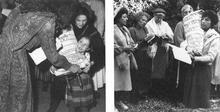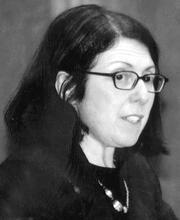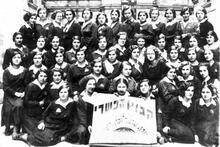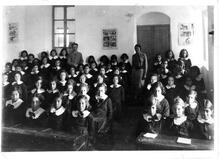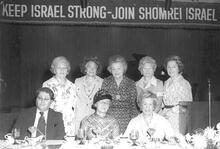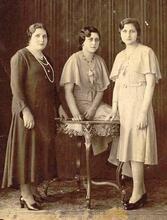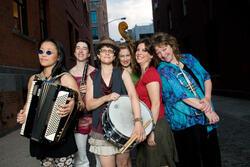Jessica Feingold
Jessica Feingold (1910 – 2003) devoted more than forty-five years of her life to carrying out the goals of the Jewish Theological Seminary. She edited fifty books that originated at the institution, while also serving in almost uncountable administrative positions, including that of principal assistant to Louis Finkelstein, who was provost, president, and then chancellor of the seminary.
Photographer: John H. Popper.
Institution: The Ratner Center for the Study of Conservative Judaism, Jewish Theological Seminary.
Jessica Feingold devoted her career to transforming the grand ideas of Louis Finkelstein, chancellor of the Jewish Theological Seminary, into reality. In 1936, Feingold answered an advertisement to become secretary to Finkelstein, then assistant to the JTS president. In 1951, Feingold became executive director of the Institute for Religious and Social Studies, an interfaith program founded by Finkelstein that brought students and theologians together. By 1959 she was director of Intergroup Activities, overseeing both programs as well as the Institute on Ethics. She also wrote articles on those programs and edited 49 volumes of their work. Feingold also served on the committee that created the Jewish Museum, to showcase the Seminary’s collection. JTS awarded her with honorary doctorates for her years of service.
Jessica Feingold was the director of Intergroup Activities at the Jewish Theological Seminary of America from 1959 to 1983 and served in administrative capacities in the seminary’s two principal “intergroup relations” programs, the Conference on Science, Philosophy, and Religion and the Institute for Religious and Social Studies.
Early Life and Education
Feingold was born on December 28, 1910, in New Orleans, Louisiana, the first of three children and only daughter of Jessie (Schwabacher) and Meyer William Feingold. Her mother was born in Chicago of a well-to-do German Jewish family. Her father was born in Romania, immigrated to the United States with his family, and grew up in New Orleans, where he studied at Tulane University.
During Feingold’s childhood in New Orleans, her father was a partner in Levy, Loeb and Company, a dry-goods business. In 1917, William Feingold accepted a position as an executive at J. Aron and Company on Wall Street, and the family moved to New York City.
Although she had gone to public school in New Orleans, Feingold and her two brothers went to private schools in New York. Jessica Feingold graduated from the Calhoun School in 1927 (originally the Jacobi School), an academically rigorous girls’ school attended by daughters of German Jewish families. She also attended the Hebrew school at Temple Emanu-El but found little there to interest her. Although the Feingolds were nominally Reform, religion played only a small part in their family life.
After Calhoun, Feingold attended Vassar College, where she experienced the social discomfort of being one among very few Jews. She graduated from Vassar in 1931, then attended Columbia University, where she received an M.A. in history in 1933. Uncertain of her vocation in a period when few professional opportunities were open to women, and in the midst of the Depression, Feingold went on to take a business course at the Collegiate Secretarial Institute.
Work at the Jewish Theological Seminary
In 1936, after two brief secretarial stints, Feingold answered a blind advertisement in the New York Times. The job was to be secretary to Louis Finkelstein, then assistant to the president of the Jewish Theological Seminary in upper Manhattan. It paid twenty dollars per week, half the amount of the allowance she was receiving at home.
Not long after, in 1938, Louis Finkelstein founded the Institute for Religious and Social Studies, the first of what came to be known as the “intergroup relations” programs at the Jewish Theological Seminary. In 1940, the same year he became president of the seminary, Finkelstein founded the second of these programs, the Conference on Science, Philosophy, and Religion in Their Relation to the Democratic Way of Life. Feingold came to be integrally involved with both of these programs. In 1951, she became the executive director of the institute; she became its director in 1964. In 1956, she was appointed executive vice president of the conference, after serving as its assistant secretary-treasurer (1944 to 1947) and secretary (1948 to 1956). From 1959 until her retirement in 1983, she was the director of Intergroup Activities, the department that encompassed both programs.
The Institute for Religious and Social Studies was an interfaith educational program for clergy. The institute’s principal forum was a Tuesday lecture series, but it also held conferences and seminars, and programs for theological students and faculty. Branches in Chicago and Boston were founded in 1944 and 1945, respectively.
While the “groups” originally implied by the term “intergroup” were Catholic, Jewish, and Protestant, by the 1950s the definition had expanded to include representatives of Islam, Buddhism, Hinduism, and other religions. The institute also expanded its program to take up questions arising from current affairs, urban problems, the arts, social sciences, and, most important, ethics in cross-cultural perspective. A separate Institute on Ethics emerged out of the Institute for Religious and Social Studies in 1956, and a World Academy of Ethics was planned during the 1950s and 1960s but was never realized. The institute continues today at the Jewish Theological Seminary as the Louis Finkelstein Institute for Religious and Social Studies.
The Conference on Science, Philosophy, and Religion
The Conference on Science, Philosophy, and Religion was founded in 1940 as an answer to the increasing distance of scholars in the sciences and humanities from one another, and from religious thought on morality and ethics. Founders of the conference felt they saw the logical conclusion of such estrangements in European fascism. The portion of the conference’s original title referring to “the Democratic Way of Life” (later dropped) reflects their wartime desire to ally their work with democratic values.
The conference’s original participants were scholars in the sciences and the humanities. Later, businesspeople, government officials, foundation officers, and others from outside the academic world were added. Topics covered by the conference over the years included ethics, race relations, labor relations, and educational policy. It was centered administratively at the Jewish Theological Seminary, and its annual meetings were held alternately at the seminary, Columbia University, the American Philosophical Society, Harvard University, Loyola University, and the University of Chicago. The conference met for the last time in 1968.
When, in 1969, it was decided that the conference should explore the possibility of involving more international participants and even of meeting abroad, Feingold undertook a four-month trip through Asia in an effort to arouse interest and recruit participants. From December 1969 through April 1970, she traveled on her own through Japan, Taiwan, Hong Kong, Indonesia, Thailand, India, Ceylon, and Iran, meeting with scholars, religious figures, and government officials. But on her return, a budget crisis at the seminary and the approaching retirement in 1972 of Louis Finkelstein doomed the project.
Other Work
Even after her time was fully occupied with matters relating to the intergroup programs, Feingold remained the principal assistant of Louis Finkelstein, who was, successively, assistant to the president, provost, president, and chancellor of the seminary. In addition to editing the forty-nine volumes produced by the institute and conference, she edited some of Louis Finkelstein’s books. Her own article, “Up from Isolation—Intergroup Activities at the Seminary,” was published in the journal Judaism in 1978.
Feingold also continued to carry out such administrative duties as serving on committees; making logistical arrangements for convocations, meetings, and other events; and entertaining seminary visitors. The pattern of her career was similar to that of a number of other talented, educated women who worked for many years in administrative positions at the seminary. While a few achieved positions of some power by force of ability, most worked behind the scenes, failing to receive appropriate recognition, in terms of titles or remuneration, in an institution that primarily valued the work of rabbis and scholars. Not until the end of Feingold’s career was the institution beginning to come to terms with women’s changing roles. In 1974, the seminary appointed a woman to the faculty of its rabbinical school for the first time, and in 1984, it admitted its first woman candidates for rabbinic ordination.
One of Feingold’s most important administrative duties, outside of her intergroup work, was her service on a committee to plan for the transformation of the Fifth Avenue mansion of Felix and Frieda Schiff Warburg into a new home for the seminary’s museum collection. In 1947, the Jewish Museum formally opened.
Legacy
Throughout her career at the Jewish Theological Seminary, Feingold saw herself primarily as a vehicle for Louis Finkelstein’s ideas. In a sense, she was. Louis Finkelstein was a visionary, charismatic man, a scholar and rabbi, as well as a leading figure in the movement for interfaith cooperation during the 1940s and 1950s. The institute and conference attracted many prominent figures, and the books of proceedings and papers that came out of the two programs went through several editions and were translated into many languages. Yet it is also true that without Feingold’s initiative, trained intelligence, and organizational skills operating, often behind the scenes, the programs would not have been the success they were. The fact that she was a rather anomalous figure at the seminary—the founding and central institution of the Conservative Movement in Judaism—a Jew but nonobservant, a woman, and unmarried, were, in this context, assets rather than handicaps. Part insider, part outsider, she was able to function as a kind of gracious bridge between the seminary and the people from a variety of religious and cultural backgrounds who came to it to participate in the institute and conference.
The Jewish Theological Seminary awarded Feingold two honorary doctorates, the first in divinity (1982) and the second in sacred theology (1983). These were added to the honorary degrees she received from Fordham University (1979) and the General Theological Seminary (1982). The conference awarded her its first Conference on Science, Philosophy, and Religion Medal in 1956.
Jessica Feingold’s life was occupied chiefly with her work at the seminary, yet during World War II she also served as the director of the West Side of Manhattan’s Air Raid Control Center, 1941 to 1945. She was also the director of the West Side of Manhattan’s door-to-door bond drives. In 1948, she was a board member of the West Side Community Centers, Incorporated. In 1976, she served on many bicentennial committees, among them the interreligious “Forward ’76.” She was also a member of the Asian American Assembly for Policy Research and the Institute for Religion and Social Change in Honolulu.
Jessica Feingold died in June 2003.
Interviews with author, July 21, 1995, and archival materials at the Ratner Center for the Study of Conservative Judaism, Jewish Theological Seminary, NYC, including oral history interview by Mychal Springer, July–September 1989.
Records of the Jewish Theological Seminary, R.G.5, Conference on Science, Philosophy, and Religion.
R.G.11, Communications Department.
R.G.1 General Files.
R.G. 16, Institute for Religious and Social Studies.
and Jessica Feingold, “Up from Isolation—Intergroup Activities at the Seminary.” Judaism 27 (Summer 1978): 283–291.



